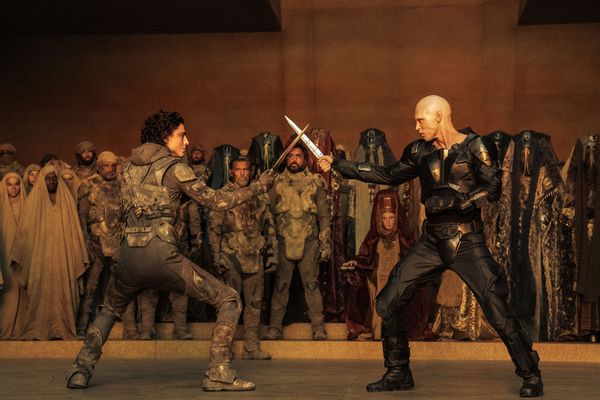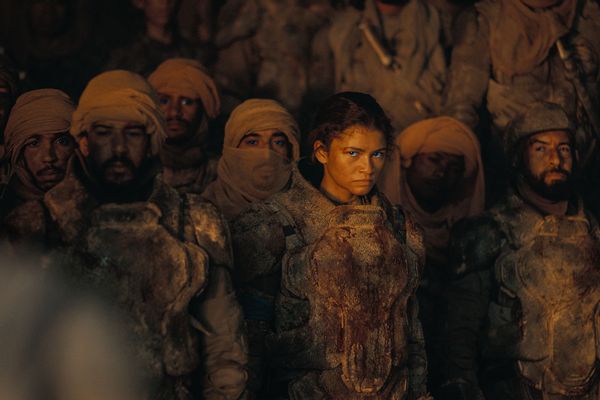Given the two-and-a-half-year wait between Denis Villeneuve’s first “Dune” and “Dune: Part Two” a lot of us are rewatching the 2021 movie or seeing it for the first time right now. Good thinking, since the plot picks up minutes after the action in the first movie ends.
For a really good time, I suggest sitting down with David Lynch’s 1984 version after watching “Dune: Part Two," solely to appreciate the tonal contrasts.
Lynch presents Kyle MacLachlan’s Paul Atreides as a savior – an outsider easily accepted by the Indigenous people of Arrakis, the desert planet his family was sent to exploit on behalf of the Emperor of the Known Universe. (We’d call him a white savior but in Lynch’s film the Fremen are played by white people too.)
Arrakis is the only planet where the all-important spice mélange can be found, the universe’s most valuable commodity that makes interstellar travel – and therefore commerce – possible. When House Atreides came to Arrakis, they replaced a far worse oppressor, House Harkonnen.
With the Emperor’s blessing and assistance, the Harkonnens turned around and wiped out the Atreides – all except for Paul and his mother Jessica, an adept of a mystical and politically ruthless all-female order known as the Bene Jesserit. TL;DR: everyone effed around and found out. To the Fremen, Paul becomes Muad'Dib, their heralded deliverer, and his victory is marked by Lynch’s Hollywood ending.
“Muad'dib had become the hand of God, fulfilling the Fremen prophecy,” Virginia Madsen’s Princess Irulan says in a serene voiceover following Paul’s triumph over the evil House Harkonnen. “Where there was war, Muad'dib would now bring peace. Where there was hatred, Muad'dib would bring love. To lead the people to true freedom, and to change the face of Arrakis.”
 Timothée Chalamet as Paul Atreides in "DUNE: PART TWO" (Warner Bros. Pictures)This certainly did make it seem as if the good guys won – and it’s true, in some sense. In Frank Herbert’s sequel to “Dune,” Muad'dib does bring peace, if you count annihilation as a type of it. “Love” also translates to mean mandatory loyalty.
Timothée Chalamet as Paul Atreides in "DUNE: PART TWO" (Warner Bros. Pictures)This certainly did make it seem as if the good guys won – and it’s true, in some sense. In Frank Herbert’s sequel to “Dune,” Muad'dib does bring peace, if you count annihilation as a type of it. “Love” also translates to mean mandatory loyalty.
“Dune: Part Two” allows Villeneuve the time to spell this out, steadily transforming Paul from a grieving son into a vindictive authoritarian, seducing us into rooting for him along the way.
That starts with casting the sylph-like Timothée Chalamet as Paul Atreides. The actor may be 28 but he can still play a convincing teenager who fights like a wushu master and looks like a sensitive teen idol, making men and women alike swoon when he rides the biggest sandworm anyone has ever seen. Sexy!
In no time at all Chalamet’s Paul morphs from a loyal Fedaykin commando into a man compelling thousands of desert fighters to upset generations of political order imposed by the Landsraad, a council composed of Great Houses like the Atreides and the Harkonnens.
In Frank Herbert’s sequel to “Dune,” Muad'dib does bring peace, if you count annihilation as a type of it.
Paul shoulders the weight of leadership reluctantly . . . at first. He confesses this to Chani (Zendaya), his levelheaded lover and an avowed agnostic, that doesn’t fully believe in the Fremen prophecy hailing the coming of “Mahdi,” or a messiah, any more than he buys into the Bene Gesserit quest to produce a super-being known the Kwisatz Haderach.
As much as he recognizes signs of those Fremen legends coming true through him he also sees his mother (played by Rebecca Ferguson) manipulating their tribes to accept him as their star. Nevertheless, and to Chani's horror, when the opportunity arises Paul fans the Fremen’s religious zealotry to seize the Emperor’s throne in a vicious shah mat that upends the political balance.
 Timothée Chalamet as Paul Atreides and Austin Butler as Feyd-Rautha Harkonnen in "DUNE: PART TWO" (Warner Bros. Pictures)Paul's final line may be the film’s most chilling. When his loyal Atreides soldier Gurney Halleck (Josh Brolin) informs him that great houses won’t recognize him as emperor, Paul turns to Fremen leader Stilgar (Javier Bardem) and says, with a touch of resignation, “Lead them to paradise."
Timothée Chalamet as Paul Atreides and Austin Butler as Feyd-Rautha Harkonnen in "DUNE: PART TWO" (Warner Bros. Pictures)Paul's final line may be the film’s most chilling. When his loyal Atreides soldier Gurney Halleck (Josh Brolin) informs him that great houses won’t recognize him as emperor, Paul turns to Fremen leader Stilgar (Javier Bardem) and says, with a touch of resignation, “Lead them to paradise."
We need your help to stay independent
That scene makes the 1984 “Dune” look like a religious education propaganda film produced in the aftermath of Paul Muad'Dib's holy war.
Reportedly “Dune” author Frank Herbert was a fan of Lynch’s interpretation, although he might have found that Villeneuve’s vision better aligns with the message he wanted to convey through his novels.
As he explained in a 1985 speech he gave at UCLA, “I wrote the 'Dune' series because I had this idea that charismatic leaders ought to come with a warning label on their forehead: ‘May be dangerous to your health.’”
Whenever a sweeping cinematic adaptation like “Dune” becomes the season’s must-see film it’s tempting to search for reasons making a specific era ripe for it to speak to us. Maybe that is appropriate in some cases; I’ve certainly made my share of those arguments.
Then again, nearly 40 years after Lynch’s version we can appreciate its perspective as a function of its time. His “Dune” adaptation was part of Universal Studios’ attempt to ensnare some of the “Star Wars” audience. That places Paul Atreides’ transformation into Muad’Dib on par with Luke Skywalker becoming a Jedi. Next to the brutish Baron Harkonnen and his psychopath nephews, Paul Muad'Dib is downright chivalrous.
However, Herbert’s stories retain their relevance because of the conclusions he drew about charismatic figures back in 1965, when “Dune” was first published as a novel. The years and changing political winds afterward have compelled many readers to categorize the series as both liberal and conservative. In truth, Herbert had no kind words for either side of the partisan divide.
"I had this idea that charismatic leaders ought to come with a warning label on their forehead: ‘May be dangerous to your health.'"
In that UCLA speech, he called John F. Kennedy “one of the most dangerous presidents we had in this century,” citing his charisma as the reason America waged war in Vietnam. The most valuable president in his view was Richard Nixon, “because he taught us to distrust government and he did it by example.”
What happens, then, if a potential leader promises to remove the faulty governance of man from the equation and replace it with what he tells his followers is God’s law?
Villeneuve is said to be working on his answer to that question for a potential third “Dune.” American voters may find out much sooner, if predictions and fears about a surge of Christian nationalists at the polls come to pass. Topping the GOP ticket is a candidate who endorsed a campaign ad claiming “God gave us Trump” and promises to usher in his version of a theocracy even though the man has been heard calling Christians “idiots.”
On Monday the Supreme Court refused to uphold the Colorado Supreme Court disqualification of Donald Trump from appearing on that state’s primary ballots. It may eventually be ruled that he fomented an insurrection against the government whose laws he was sworn to uphold when he was president.
For now, however, the highest court in the land left it to Congress to enforce the 14th Amendment provision prohibiting insurrectionists from holding office. House Speaker Mike Johnson, R-La., a Christian Nationalist, will ensure that doesn’t happen. Lead them to paradise, indeed.
Want a daily wrap-up of all the news and commentary Salon has to offer? Subscribe to our morning newsletter, Crash Course.
“Dune” holds many allegories in its narrative, including within Herbert’s key moral of the story. It’s also pro-environmental conservation and multiculturalist, with the best part of the Atreides’ story being the desire of Duke Leto, Paul's father, to live with the Fremen and respect their mastery of “desert power” instead of subjugating them.
If he had lived that probably would have gone badly too, living up to Herbert’s broader conclusion – this story is not just about one man but all of them. “Why do 900 people go to Guyana and drink poisoned Kool-Aid?” Herbert went on to ask his UCLA audience. “Why do the citizens of an entire nation — most of the citizens anyway — say ‘Sieg Heil’ and murder some three [sic] million Jews and Gypsies? Why do they not question their leaders?”
Some of us are posing such interrogations, but perhaps not enough. Maybe this blockbuster’s perspective can help broaden that vision, if we’re willing to look for what Villeneuve is transmitting besides what he accomplishes through the superb acting and sensory exhilarating visuals and soundtrack.
 Zendaya as Chani in "DUNE: PART TWO" (Warner Bros. Pictures)To that end, the image “Part Two” leaves us with holds as much significance as the line announcing Paul’s heel turn. While Paul is stalking into the center of the Fremen universe, Chani tries to warn her people that his path is false.
Zendaya as Chani in "DUNE: PART TWO" (Warner Bros. Pictures)To that end, the image “Part Two” leaves us with holds as much significance as the line announcing Paul’s heel turn. While Paul is stalking into the center of the Fremen universe, Chani tries to warn her people that his path is false.
So while most of her Fedaykin confederates heed Muad’Dib’s call the war, a betrayed Chani heads back to her desert and calls a sandworm to ride to parts unknown. Zendaya doesn’t utter a word in that sequence. Her face says it all – she’s disillusioned and angry, but purposeful. She shows no fear. We may disagree on what Herbert meant to say about power and politics through these books, but on that emotion and its effect on our collective intelligence he’s as clear as a desert sky.
"Dune: Part Two" is now playing in theaters nationwide.

Shares